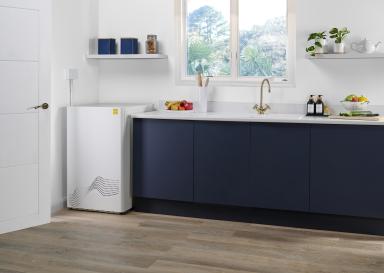What is the alternative to a heat pump?

What is the alternative to a heat pump? It's a common question, in no small part because we don’t want to find space inside and outside the home for the equipment.
80% of gas households have a conveniently compact combi boiler and they will be hard to part with. Sadly small boilers are not a reality for future heating systems, not for houses at least, as hydrogen is highly unlikely to be suitable for home heating. Most of us will have to give up some space to a physically larger electric heating system and that could be an electric heat battery boiler.
Why is the way we heat our homes changing?
Providing heating and hot water to our homes accounts for 17% of the UK’s carbon emissions. This means that gas and oil boilers will need to be replaced with forms of electric heating, as electricity can be generated using renewable and low carbon sources. Heat pumps carry many advantages and will play a huge part in this move away from fossil fuel heating, but with such a diverse housing stock in the UK there can’t be a one-size-fits-all approach. Future homes will utilise a range of innovative electric heating technologies.
The role of heat batteries
One such emerging technology is heat batteries. Normal batteries (including home and EV batteries) store electricity for later. Heat batteries use dense natural materials to store heat at high temperatures that can be released slowly over a 24 hour period. Old fashioned electric storage heaters were a form of heat battery, although arguably not very effective at keeping homes warm throughout the day as they couldn’t store the heat for long.
The first heat battery boiler
Tepeo has evolved the heat battery concept into a smart controlled heat battery boiler, knows as the ZEB (Zero Emissions Boiler). In the right circumstances, the ZEB can serve as a direct replacement for a gas boiler, but to be clear it is not a combi, it works with a hot water cylinder.
The main features of the ZEB are:
- A drop in replacement for heating demands of 3,000-12,000kWh - typically 2-3 bedroom modern homes and flats or maisonettes
- No outside unit needed, but it does require more inside space than a gas boiler and, like a heat pump, needs a separate hot water cylinder
- Works with existing radiators and heating controls
- Self-programmes to charges during off-peak tariffs, keeping running costs low
Utilising low-cost electricity tariffs
Heat battery boilers are designed to charge up during off-peak times when certain electricity tariffs are much lower. For homes with a low heat demand under 12,000kWh per year this can reduce running costs in line with a gas boiler. For homes with a larger heat demand, the ZEB would need to charge a second time at peak time tariffs which would cost more than a gas boiler.
Most energy providers have at least one off-peak tariff. The most popular tariffs are via Octopus where off-peak charges are on a par with gas prices and sometimes lower, but only for those homes with a heat pump or electric vehicle. All households can access Octopus' Agile tariff where electricity prices can be very low but also much higher than standard tariffs. The ZEB can optimise for the lower tariff periods, however it is important that the homes' other electrical uses are also shifted to low cost periods.
Heat battery boilers v electric boilers
Households are increasingly considering electric boilers as an alternative to gas boilers. Available in compact, wall hung models, and even as a combi, they feel familiar and an easy step away from fossil fuels.
But beware, they will cost 3-4 times more per year to run than your gas boiler as they use peak rate electric (at the time of writing 27p per kWh) compared to gas at 7p per kWh. The tepeo on the other hand will cost 7.5-9.5p per kWh on the Octopus off-peak tariffs (but only if you have an electric vehicle).
This is because an electric boiler doesn’t have any storage capacity - meaning that when you want heating in the evening it has to take directly from the grid at peak times and at 27p per kWh. The ZEB stores the off-peak electricity as heat within its core at a lower cost and sends this around your home when your thermostat calls for it.
For those that want a combi boilers, again beware. Electric combis will only provide 3-6 litres per minute flow rates to your taps (compared with 9-16 litres per minute from a gas combi), which is not enough to run a decent shower or bath.
Helping ‘the Grid’
The National Grid has committed to decarbonising by 2035 which involves, amongst other things, renewable energy playing a much bigger part in our energy mix. The problem with renewable energy is that the sun doesn’t always shine and the wind doesn’t always blow when we want to be warm in our homes and sometimes it blows too much.
For example, on a windy night the grid may produce a surplus of electricity from windfarms because demand is so low. The grid needs to be able to store this electricity for later when demand is greater. The rise in home batteries and EV batteries provides the grid with lots of places to store surplus electricity and we are incentivised to do so with lower cost tariffs. However because we don’t yet have enough storage, some of this available energy goes to waste.
In the right homes, heat batteries have an important role to play in providing grid flexibility and harnessing electricity from green sources such as windfarms when it is available.
Speeding up decarbonisation
Electricity is still produced using gas as well as solar, windfarms and nuclear sources. All the time we continue to use gas to generate electricity we are only partly decarbonising our energy use.
However, there are times when a large % of electricity is produced using only renewable sources which generate a surplus during off-peak periods. Heat batteries have the potential to identify when electricity is cheapest and charge up during these times, making the most of the surplus and ensuring that it doesn’t go to waste and supporting decarbonising the grid.
